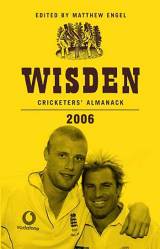
|

Marcus Trescothick's virus line has his former opening partner in suspicion
© Sky Sports
|
|
Player pundits: whose side are they on?
It's a strange little tale - the curious case of the stand-in captain who made a run for it - and the plot keeps on thickening. Marcus Trescothick gave an interview to Sky Television last week which did the exact opposite of what was intended: it muddied waters, raised hackles, and gave the story fresh legs. The "family, personal reasons" that had driven Trescothick home at high speed now turned into "a virus" with elements of burn-out.
The idea that Trescothick should have been exhausted was perfectly understandable. What was baffling was the fact that the England management tried to conceal it. As usual with cover-ups, the cover-up was more of a problem than the problem it was supposed to cover up.
Trescothick is much liked, and even after his story changed, most commentators were gentle with him. But one pundit was conspicuously tough: Mike Atherton, cricket columnist for the Sunday Telegraph, who said Trescothick's virus line was "so utterly implausible" that "ridicule is the only proper response".
Atherton used to open the batting for England with Trescothick. He was a team-mate for years at Lancashire of Trescothick's agent, Neil Fairbrother, who also came in for criticism in Atherton's piece, albeit unnamed. The condemnation possibly went a touch too far, but it came from the right place: a belief in honesty. Atherton can't stand spin - of the PR variety - and he is right to highlight the way it is spreading through the sports world.
Atherton is one of the best ex-player pundits for three reasons. He wants to get better; after a tentative start, his writing has steadily acquired more scope and flair. He is curious: he asks questions, while some ex-players still wait for the questions to come to them. And he has a clear grasp of the importance of being independent. He knows he is now batting not for England, but for his readers.
In a free press, that distinction is straightforward. In televised sport, it is becoming a grey area. The ultimate producer of cricket in India is now the Indian board. Atherton, who commentated for Sky on the India-England series, says local commentators were "asked not to mention sensitive subjects". This provoked denials, but it will continue to be an issue. And some ex-players just don't seem to see that it matters.
At the BBC, Roger Mosey, the new head of sport, has just declared that "independence is non-negotiable". If a state-funded broadcaster can see that, so can the rest. It follows that journalists will loom larger in sports coverage, and ex-players smaller. Mosey issued a warning to the stars who move behind the microphone: "if they are good they will have a role, and if they are not they will not". Which is spot on.
The new Wisden: two cheers and a boo

|

For the third year running, the Wisden Almanack shows more than one player
© Wisden
|
|
Independence is the soul of Wisden. When the new Almanack was published, I was on holiday in Venice, for family, personal reasons, which may turn out to have been a virus. We played cricket on the Lido, where the pitch was almost as low and slow as the surfaces on which a makeshift England were being thrashed by a makeshift India. Otherwise the game made its presence felt only in the British papers - where, as ever, Wisden was getting a fair wind. I soaked up the coverage and reached three conclusions.
The new large-print, large-page edition is the sort of idea that ought to get ex-editors harrumphing, but it's too good to knock. Newcomers to the Almanack staff are surprised to find that the proof-reading - a process that roughly resembles doing the dusting at the Taj Mahal - takes place on pages blown up to A4. If the unmagnified print is too small for the staff, mostly in their 40s, it is certainly too small for the older reader. The big edition is steeply priced, at £50, but it will surely sell out.
In each Almanack, there are a few sentences that achieve booming resonance. Matthew Engel has written plenty of them in his two stints as editor and he has come up with another this year in tackling the ICC's longing for expansion, which lies behind the existence of the Champions Trophy and the bloating of the World Cup. "It is time to stop wrecking the game we do have," Engel writes, "in vain pursuit of the one we don't." Rhythmic, pithy and true, this line is everything that statements from the ICC are not. In fact, it may have to be translated if it is to be understood in Dubai. What Matthew means, gentlemen, is that in terms of the processes the executive board has put in place, the current policy on global development does raise the probability of a high level of damage being sustained to the fabric of the game, not to mention the sanity of the players, among the current major stakeholders.
Amid the cheers for Wisden, there is room for one small boo. The cover photograph isn't quite right. For the third year running, it shows more than one player - this time, Andrew Flintoff and Shane Warne. This is an honour that either man fully deserves, but giving it to both isn't the answer: it's a hedged bet. Flintoff should have pipped Warne to the cover, because the year belonged to him. And Warne should have pipped Flintoff to be named leading cricketer in the world, because he wins more Tests.
Tim de Lisle edited Wisden 2003, the first one with a photo on the cover. These days he just edits www.timdelisle.com

